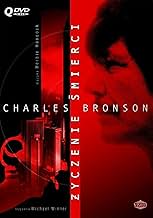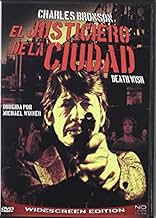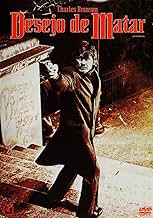Un architetto di New York decide di farsi giustizia da solo a seguito dell'omicidio della moglie per mano di alcuni teppisti, uscendo di notte e uccidendo i potenziali aggressori che si aggi... Leggi tuttoUn architetto di New York decide di farsi giustizia da solo a seguito dell'omicidio della moglie per mano di alcuni teppisti, uscendo di notte e uccidendo i potenziali aggressori che si aggirano per le strade poco sicure della città.Un architetto di New York decide di farsi giustizia da solo a seguito dell'omicidio della moglie per mano di alcuni teppisti, uscendo di notte e uccidendo i potenziali aggressori che si aggirano per le strade poco sicure della città.
- Regia
- Sceneggiatura
- Star
- Premi
- 1 vittoria e 2 candidature totali
- District Attorney
- (as Fred Scollay)
- Lt. Briggs
- (as Ed Grover)
Recensioni in evidenza
This is one of my favorite films made from one of my favorite books. I lived in New York during the 1970's and can attest that crime was out of control then, the subways, parks and many streets were no man's land at night where you only went if you really had to or else you wanted to score dope, get a cheap hooker (or be one), or just for the thrill and danger. Police corruption had been so rampantly widespread for so long that there was no law and order and the thugs had taken over the night. If you question this just see Serprico and read that book which details how one honest cop almost died and was nearly buried by the massive tide of corrupt cops he was trying to expose, which was practically all the other cops. The majority of the people lived in fear of being in the streets at night and even many places during the day. Even if you packed heat that was no guarantee of anything, it wasn't uncommon to come across a gang of muggers all carrying guns, knives, baseball bats, etc. Most people in New York then were as Paul Kersey described only worse, not only did they run and hide from fear and danger but they ignored the suffering of others. New Yorkers had developed a reputation as cold and indifferent, which was fairly accurate. I remember a concert in Central Park where a girl was gang banged by a group of guys and hundreds of people just watched it, too afraid, too apathetic, or too vicariously sadistic to get involved. Someone even stole her clothes and she staggered around naked and bleeding in the rain. Things were not good and just about everybody in New York felt angry, alienated and helpless. People were sick of it all, the terrible Vietnam war, corrupt Richard Nixon, corrupt cops, corrupt everything, but they mostly were sick of being afraid and tired of living in fear.
Then the movie "Death Wish" came out. The theater was packed when I went, which surprised me, as I had already read the book and knew what it was about but how did these other people know, besides it was a matinée. I discovered why everyone was there when Paul Kersey shot his first mugger: the whole place exploded in screaming cheers and the cheers got more powerful and louder with each subsequent vigilante act. I had been to Yankees games and concerts where you hear screaming and cheers but nothing had the power of the cheers on that day. There was something wonderfully cathartic taking place, everyone in that audience who had ever been mugged or had been afraid of being mugged, which was virtually everyone, was delighting in having the tables turned. We felt safe, and were happy to see a somewhat soft spoken, average kind of a guy being played by Charles Bronson kick a*s for us, take out the bad guys. This was a new, radical concept back then, an open revenge film where an ordinary appearing guy beats the muggers at their own game. It was a great experience and we all felt like we too could be as tough as Charles Bronson, at least during that safe little reprieve within the theater.
Say what you will about the film, its technical shortcomings, you'd be hard pressed or less than honest to say that Charles Bronson didn't display his international appeal in this movie, the one that made him the world's biggest box office draw. He appears in this movie just like he was in real life, a quiet, unassuming kind of guy who really was tough, not the usual Hollywood tough guy who is so unconvincing because he can't fully hide his physical and character based qualities that are everything but a real, quiet, cool tough guy. Bronson was the real deal, just read about his earlier life if you want to know.
This film got a lot of negative reaction as being a crass and brutal revenge film, and other typical cavalier comments. The New Yorkers who lived it, all the ones I knew and the ones in the theater that day, loved it for what it was, a piece of cinematic magic to make us feel like we weren't afraid and would perhaps very soon never have to feel afraid again. If you've never been mugged or been afraid of being mugged it's very easy to tell others how they're suppose to react, what they're suppose to like, think, do, etc. But until you've lived in a real urban jungle, you'll never know the great release that a movie like "Death Wish" can bring you. It's strictly vicarious entertainment but what marvelous entertainment it is!
New York businessman Paul Kersey (Charles Bronson) is devastated when his wife (Hope Lange) and daughter (Kathleen Tolan) are sexually assaulted in their own home. His wife dies from her injuries and his daughter is so deeply traumatized that she is left in a permanent vegetative state. Kersey tries to get some normality back into his life through work, but deep down inside he's burning for revenge. He knows he will never get the actual gang who harmed his family, but he also realises that crime in general is spreading through the city like a plague. So, armed with a gun and a sense of vigilante justice, he starts patrolling the streets by night, killing muggers, hoodlums and rapists. But for how long can he hand out his own brand of justice without being caught? And at what point does his course of action stop being justifiable? When does he become just as bad as the crooks he is trying to rub out?
The film is based on a Brian Garfield novel, but in the book vigilantism was illustrated as an extension of crime - just another problem as opposed to a solution. Here Michael Winner, a director always happy to create a few ripples, presents the vigilante as an out-and-out hero. The film basically gives a great big nod of approval to Kersey's actions. The sense of humour really helps the film (I still laugh at the scene where some construction-workers kick the hell out of a crook, and one workman nonchalantly states to the TV reporters: "Erm, we roughed him up a bit before the cops arrived!") Death Wish was a pretty influential film for its era, and in spite of its dated air and its morally dubious stance, it is still a great flick. Just make sure you steer clear of its four utterly terrible sequels.
This was a very, very simple story and it panders to our base instincts which is probably why it was so successful. Most people want justice, and they want it now....which is what this movie preaches. At the time, the movie was shocking. If it came out today, it wouldn't have nearly the impact. However, the early scene of the mother and daughter raped and killed is still horrifying. That will never change.
The story then slows down as we see the transformation of the husband, from conscientious objector to vigilante. When Charles Bronson hits the streets, the film picks up big-time. The movie also ends on a very satisfying note.
Not only is this the film debut of both Jeff Goldblum and Denzel Washington, it is possibly the greatest revenge film of all time. A mild-mannered veteran -- now working as an architect of all things -- going ballistic? Awesome! I have no idea why I waited so long to see this movie... it kicks all kinds of butt, and presents a very interesting amoral picture. Not immoral, but amoral. Do you cheer him on or hope he gets caught? It is a timeless dilemma.
"Death Wish" was a highly controversial film when initially released. At the time, major cities were facing a deadly crime epidemic, and this film tapped into the fears and unspoken desires of many viewers, giving them a chance to live out their secret fantasies. Critics on the Left lambasted its politics on crime, and even some on the Right felt it went too far. One could find much to complain about from an ideological standpoint. One could point out that the film is manipulative and heavy-handed (the attack on Kersey's family comes right after his co-worker tells him he's a "bleeding-heart liberal"). Yet, it is undeniably compelling; one of these movies that makes you wonder, "what if this happened to me?" In light of the later, inferior sequels, it is fascinating to see how the character came to be, how he made the transition from law-abiding man to cold-blooded vigilante. It is not an easy transition to make by any means--after his first kill, he breaks down and vomits the moment he reaches home. Yet, as his kills (each is very suspensefully handled) occur with greater frequency, we get the sinking feeling that he has reached a point of no return. Indeed, he narrowly eludes capture on at least two occasions, and there is the certainty that it is only a matter of time before the law will catch up with him.
Bronson is highly effective here; while not one of the great actors, he has a very strong screen presence. The audience is on his side every step of the way, rooting for him even as he strays onto the wrong side of the law. Surely, he is entitled to justice, but at what point does his vengeance outweigh his grievances? Vincent Gardenia is effective as the police detective assigned to his case. He grudgingly admires Kersey's resolve, although he is sworn to put a stop to the killings. The manner in which this is resolved is creative, though its plausibility is less than certain. The film is also noticeable for an early appearance by Jeff Goldblum as a slimy thug. However, Steven Keats is somewhat ineffectual as Bronson's son-in-law (he just sorta got on my nerves). In the years to come, this film would be followed by an endless chain of sequels and rip-offs, many of them starring Bronson himself, reducing him to a stock character whose only attribute was blowing the bad guys away. A shame, considering he was once an internationally respected actor. "Death Wish" is nonetheless a well-crafted, tightly paced crime drama, despite some dated aspects. It still kept me interested throughout and made me more interested in viewing more of the star's other films--good or otherwise.
Rating: *** (out of ****)
Released by Paramount Pictures
Lo sapevi?
- QuizAfter finishing L'assassino di pietra (1973), Charles Bronson and Michael Winner wanted to make another film together, and were discussing further projects. "What do we do next?" asked Bronson. "The best script I've got is 'Death Wish'. It's about a man whose wife and daughter are mugged and he goes out and shoots muggers," said Winner. "I'd like to do that," Bronson said. "The film?" asked Winner. Bronson replied, "No . . . shoot muggers."
- BlooperKersey's first shooting victim is hit in the abdomen, but a police investigator at the crime scene the next morning refers to a bullet hole in his chest.
- Citazioni
Paul Kersey: Nothing to do but cut and run, huh? What else? What about the old American social custom of self-defense? If the police don't defend us, maybe we ought to do it ourselves.
Jack Toby: We're not pioneers anymore, Dad.
Paul Kersey: What are we, Jack?
Jack Toby: What do you mean?
Paul Kersey: I mean, if we're not pioneers, what have we become? What do you call people who, when they're faced with a condition or fear, do nothing about it. They just run and hide?
Jack Toby: Civilized?
Paul Kersey: No.
- Curiosità sui creditiActresses Olympia Dukakis ('Cop at the Precinct') and Marcia Jean Kurtz as Marcia Jean-Kurtz ('Woman at Airport') get credited in opening credits only. There's no mention of them in the closing credits.
- Versioni alternativeThe UK version classified in 2006 by the British Board of Film Classification retained the 18 certificate, but all of the BBFC's previous cuts were waived.
- ConnessioniFeatured in Precious Images (1986)
- Colonne sonoreDeath Wish (Main Title)
Written and Performed by Herbie Hancock
I più visti
Dettagli
- Data di uscita
- Paese di origine
- Lingue
- Celebre anche come
- El vengador anónimo
- Luoghi delle riprese
- Bear Down Gym, University of Arizona, Tucson, Arizona, Stati Uniti(basement firing range)
- Aziende produttrici
- Vedi altri crediti dell’azienda su IMDbPro
Botteghino
- Budget
- 3.000.000 USD (previsto)
- Lordo Stati Uniti e Canada
- 22.000.000 USD
- Lordo in tutto il mondo
- 22.000.000 USD
- Tempo di esecuzione1 ora 33 minuti
- Mix di suoni
- Proporzioni
- 1.85 : 1
Contribuisci a questa pagina






































